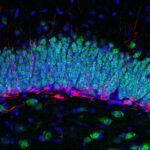Lien vers Pubmed [PMID] – 25158900
Brain Struct Funct 2015 Nov;220(6):3673-82
The process of learning mainly depends on the ability to store new information, while the ability to retrieve this information and express appropriate behaviors are also crucial for the adaptation of individuals to environmental cues. Thereby, all three components contribute to the cognitive fitness of an individual. While a lack of behavioral adaptation is a recurrent trait of intellectually disabled patients, discriminating between memory formation, memory retrieval or behavioral expression deficits is not easy to establish. Here, we report some deficits in contextual fear behavior in knockout mice for the intellectual disability gene Il1rapl1. Functional in vivo experiments revealed that the lack of conditioned response resulted from a local inhibitory to excitatory (I/E) imbalance in basolateral amygdala (BLA) consecutive to a loss of excitatory drive onto BLA principal cells by caudal hippocampus axonal projections. A normalization of the fear behavior was obtained in adult mutant mice following opsin-based in vivo synaptic priming of hippocampo-BLA synapses in adult il1rapl1 knockout mice, indicating that synaptic efficacy at hippocampo-BLA projections is crucial for contextual fear memory expression. Importantly, because this restoration was obtained after the learning phase, our results suggest that some of the genetically encoded cognitive deficits in humans may originate from a lack of restitution of genuinely formed memories rather than an exclusive inability to store new memories.

